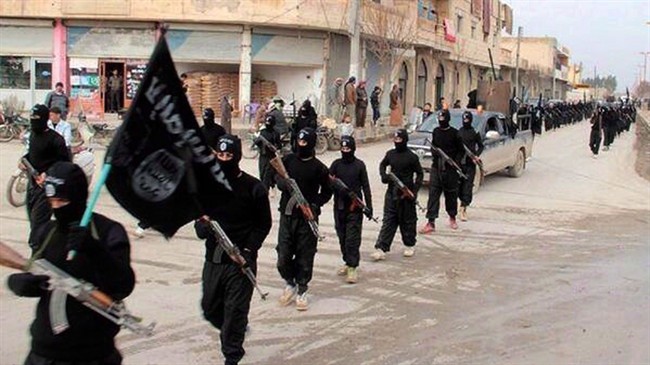When it comes to prosecuting Canadians who fight abroad for terrorist groups, saying that charges should be laid is easy.

But when it comes to actually laying them, things aren’t always quite so simple.
READ MORE: Canadian member of Islamic State caught, but RCMP struggle to lay charges against ISIS fighters
As Global News has reported over recent days, there are currently 13 Canadians, including three ISIS fighters, being held in northern Syria and who want to return to Canada. But the issue of their return raises questions about how, when or if law enforcement will pursue charges against them.
Only four sets of charges have been brought over the last two to three years against Canadians who travelled overseas to fight for groups like ISIS.
That’s because laying charges against someone for fighting with or assisting a terrorist group like ISIS is not always a straightforward matter.
It boils down to the question of exactly what kind of evidence police can get their hands on.
WATCH BELOW: Canadian member of Islamic State caught and held in Syria speaks with Global News

“Do we have sufficient evidence we can take to a criminal court?” said Stephanie Carvin, an assistant professor at Carleton University who specializes in national security issues and terrorism.
Carvin noted that while law enforcement might know a person participated in terrorist activities, that information does not always come from means that can actually be given weight as evidence in a Canadian court.
READ MORE: Ralph Goodale mum on what Ottawa will do with returning Canadian ISIS fighters
Wesley Wark, a visiting professor at the University of Ottawa who also specializes in national security, said that while Canada has experienced a relatively small number of cases of individuals travelling to join ISIS, that matter of evidence is one of the main factors that can challenge prosecutions.
WATCH BELOW: Traumatized by war, Islamic State’s child fighters learn to love again

“Any prosecution in a Canadian court will have to depend on made-in-Canada evidence, collected by the RCMP,” he said.

Get daily National news
“It cannot depend on so-called third-party information, whether from allies like the U.S., or from conflict states themselves. Such evidence would either not be allowed to be presented or would be inadmissible. It cannot depend on CSIS or CSE information, which would not be available in open court. So the challenge for Canada is to come up with an evidentiary basis that can withstand the adversarial judicial system, itself important to democratic justice. That challenge is not insurmountable, just difficult.”
WATCH BELOW: This is what the inside of an Islamic State car bomb looks like

Both Carvin and Wark also pointed to an additional factor.
That’s the fact that law enforcement agencies are, by their very nature, not inclined to take risks.
“We just don’t have a lot of experience and our national security agencies are relatively risk-averse,” Carvin said.
WATCH BELOW: Canadian ISIS fighter captured in northern Syria says he wants to return to Canada

And when it comes to prosecuting foreign fighters, the lack of experience Canada has with those cases combined with the difficulties in gathering evidence can make them seem an unwieldy risk to agencies eager to secure a conviction both as a benchmark for themselves and as a warning to other extremists.
“It is in their mandate to weigh cases on the basis of their likelihood of success and their overall deterrent value,” Wark said. “Fair enough. But this can lead to a general unwillingness to prosecute without a burnished pile of evidence and a for-sure win. That is not necessarily a good thing.”
Over the past year, the cases of two Canadians suspected of being foreign fighters, in particular, have been repeatedly raised as examples of the challenges law enforcement face in trying to put together a solid case.
“Jihadi Jack” Letts is a British-Canadian man being held in Syria after allegedly fighting for ISIS who has asked to be brought back to Canada.
News of his request prompted discussion about what options might be available to authorities to prosecute him.
READ MORE: Reality Check: What could happen if ‘Jihadi Jack’ comes to Canada?
Prosecuting him for travelling to participate in terrorist activities would not work because he left from Britain, not Canada, to head to Syria.
Pursuing a charge of participating in terrorist activities could be an option but would depend, again, on whether Canadian law enforcement is able to obtain evidence that can stand up in a court of law.
READ MORE: Tory MPs call for action against self-confessed ISIS recruit living in Toronto
Abu Huzaifa al-Kanadi is another Canadian who fought with ISIS.
He is reportedly now living in Toronto but told the New York Times’ Caliphate podcast earlier this year that he shot people in the head as an executioner for ISIS.
While critics called for the government to take action, the options available to law enforcement without evidence they had gathered themselves were limited.
WATCH BELOW: Canadian ISIS fighter captured in northern Syria speaks out

However, it remains to be seen what will happen in the case of a third man who is being held in a Kurdish prison after attempting to return to Canada from Syria.
Muhammad Ali joined ISIS in 2014 but was taken into Kurdish custody with his Canadian wife and two children — both born in Syria — four months ago after he tried to cross from Syria into Turkey.
In addition to serving as an ISIS sniper, Ali also posted messages online encouraging other people not only to come and join the terrorist group but also to launch attacks of their own wherever they were located.
Those messages could prove key in securing charges that might not be possible in other cases.
“There’s definitely potential for charges to be laid,” said Carvin, pointing to the social media posts by Ali.
Craig Forcese, also a national security expert at the University of Ottawa, agreed.








Comments